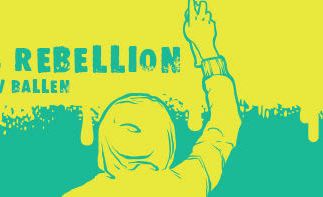
Love Therapy
Josh's prognosis was "guarded" to poor. From a prognostic perspective, he should have landed in a sanatorium or prison. So what glued him to a Breslever rabbi?

Josh grew up in a Jewish community in Cleveland, Ohio. Many of the values woven into his family life were the same values that much healthier families believed in: a strong Yeshiva background for the boys, a modest environment for the girls. So why did Josh run away? What caused him to hate his parents and almost everything they stood for? And, after he got married – why did his wife leave with the kids?
There is one answer for all of these questions: Josh was given everything by his parents – except for their time and love. When was he noticed? Only when they had criticisms – only when they were in the mood to destroy. This left a gaping hole in his heart. His pain turned to rage. It was better to hurt than be hurt, he thought. So when Josh became angry, he was also destructive or he drank. Josh became a vicious lone wolf that no one understood.
Josh hit bottom when his wife left. He reached out for help. He had never done that before. He found Rabbi Brody, the first person he ever met who focused on Josh’s positive qualities. Josh found that he liked and trusted the Rabbi and therefore could rely that the  Rabbi was telling him the truth. It defied logic and psychological theory. Once Josh was receiving all types of positive reinforcement and love from the Rabbi, he could now started giving to his wife and she came back. He started giving to his children and spending time with them. He sat with them and told them stories. They went camping together. He was giving the patience which he had never received. He was giving the love which he had never received. From where did this new “programming” come? It was not from having been complimented or from pleasant memories of family outings – that never happened.
Rabbi was telling him the truth. It defied logic and psychological theory. Once Josh was receiving all types of positive reinforcement and love from the Rabbi, he could now started giving to his wife and she came back. He started giving to his children and spending time with them. He sat with them and told them stories. They went camping together. He was giving the patience which he had never received. He was giving the love which he had never received. From where did this new “programming” come? It was not from having been complimented or from pleasant memories of family outings – that never happened.
There was no psychological reason for Josh to trust Rabbi Brody. According to developmental psychology, he was severely damaged at a critical time. He suffered from severe trauma and developmental arrest. He was fixated emotionally at an infantile level of development. At best his prognosis was “guarded” to poor. From a prognostic perspective, he should have landed in a sanatorium or prison. So what was the force that glued him to Rabbi Brody? What brought him to the land of his forefathers? How did he become one who abandoned himself to help a dying person? From where did this “infant” have the strength to fight for a stranger to receive her fair inheritance? How does one who was treated worse than a dog trust a Rabbi? I have no idea. I only know that Rabbi Brody found the good in Josh and put lots of love into him in a very short time. It leave us therapists scratching our heads.
The power of love comes from the power of Faith. It takes courage on the part of the giver to believe that his love will bear fruit – that his repeated effort to give is worth it no matter what. To love is to believe in Hashem – but there are no guarantees. When people become blocked in their ability to love, Hashem intervenes as He did recently with a couple I know.
For some strange reason, like most of us, the Teitelbaum’s (name changed) expected their children to follow what they said rather than how they lived. They said that a computer is evil and dangerous, but they lived with their matching laptops in full view. Dad had a heter (permission) from the Rabbi – his computer is for business – and yes, he expected his children to believe that. Mom uses her computer mostly for recreation, but that is alright because she is a mature adult. I can tell you that mom actually is responsible in her use of the computer, and so is dad – but that begs the issue: action speaks louder than words. We cannot hide our real values from our children. Hashem challenges our children to decide for themselves what to believe in and He challenges us to keep loving them regardless.
When Alan Teitelbaum was 18, his grandparents from the U.S. paid for him to make a visit. Of course his parents warned him about the potentially corrupting influences of anti-religious family members. They strictly forbade him to accept any electronic items as gifts and explicitly told that to the family abroad. Well Grandma had a kind nature and just could not resist. She bought Alan a brand new Dell. Mom and Dad yelled and carried on. How could Grandma do such a thing? And how could Alan betray them? They decided that the situation called for “tough love.” Unless Alan refused this gift he would not be welcome to come home.
What kind of insanity is this? Before the issue was a computer. Now the stakes are much, much higher. OK, we all know that lachatchila (in the first place) it is preferable to not have a computer in the house – so in this case they had one. This does not have to spell automatic problems for the children, G-d forbid. Of course there are risks to having a computer in the house. But sometimes it actually means, for some reason, that Hashem wanted it that way. We can strive to improve in the present; but when it comes to the past – we only have emuna.
Rav Shalom Arush is not one to exaggerate. When he tells us that the power of love can move Heaven and Earth he means just that. The power of love comes from Faith in G-d. I want to be clear that Reb Shalom Arush in no way condones having a computer at home. I just want to say, from my experience, that it is not the children who are being loved unconditionally who are falling prey to the computer – it is the children who are not being loved. G-d save them!
There are no guarantees in life – but we know from Rav Shalom Arush, that parents who abstain from criticisms, lectures, and punishments stand the best chance of raising healthy and successful children.







Tell us what you think!
Thank you for your comment!
It will be published after approval by the Editor.